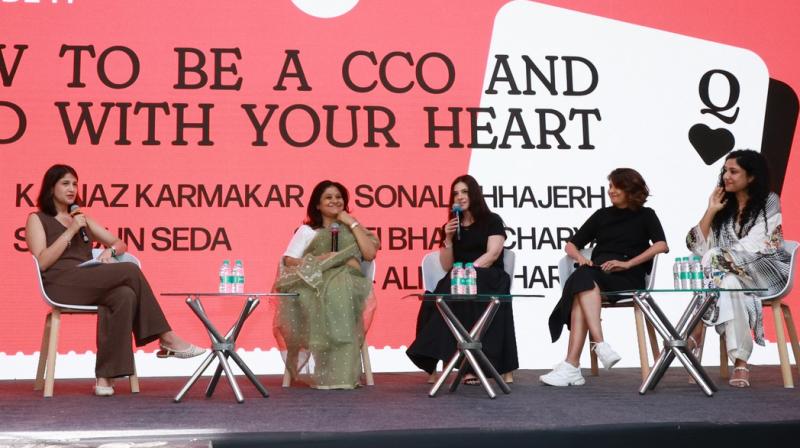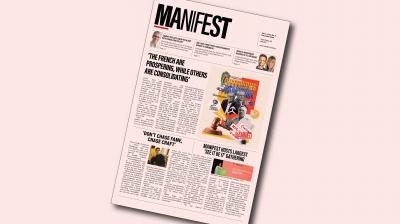The first edition of the Cannes Lions’ See It Be It programme, hosted in Mumbai on 14 November by Manifest and Indian Creative Women, featured a panel moderated by Alisha Sharma, ECD, The Script Room. The panellists included Kainaz Karmakar, CCO, Ogilvy India; Swati Bhattacharya, former head, Lightbox Creative Lab, Godrej Consumer Products; Sonal Chhajerh, NCD, Leo India; and Shagun Seda, head - brand strategy and marcom - sports and live experiences, JioStar.
The panellists discussed ‘how one can be a CCO and lead with the heart’.
Leading with your heart
Setting the context for the discussion, the panel began by discussing what it means to lead with heart.
Seda voiced, “Leading with one’s heart is gender blind. We have grown up seeing leadership as only one sort of adjective which is very masculine. I've been a leader for more than a decade now, and I feel that as one starts taking on larger teams and mandates, leadership is not just about how one leads a team, but it's also about how one can lead peers. It’s also how one can show up as a leader, even among the managers. Leading with the heart is all about leading with connection. It's not just about having that clarity and that vision, but about being curious. It's also about being vulnerable and having a spectrum or emotional agility to power up and power down, depending on the kind of rooms that you are in."
Emphasising the importance of authenticity, Karmakar observed, “Leading from the heart is about being authentic. One has to be authentic to who one is and what the leadership style is. There is no one style of leadership. Everyone has their own style. But there are certain core values that are your responsibility when one is a leader, and one has to deliver on that. One has to be fair - deep inside all of us know what is right and what is wrong, and need to do the right thing, even if it feels tough to do. And do it with empathy. Even if I am giving hard feedback to people, I give it with clarity, so that when they leave, they know exactly what I’m saying and what I expect from them when they come back into the room.”
Missing support for motherhood in the industry
Addressing the industry’s continuing failure to retain women after motherhood, Bhattacharya remarked, “We are losing women to motherhood. We are losing women because organisations still haven't got their act together on how to support them. They need to understand that if you stand by someone, just for that one or two years, you will get so much more from the person.”
Recounting her experience of coming back to the industry after motherhood, Chhajerh shared, “Motherhood was the toughest part of my career because I was dealing with challenges that I had never encountered before. Emotional feelings were at another level. And when it comes to going back to work, one feels that the person has been stagnated for a few years. The portfolio is old. It’s a tremendously difficult journey coming back because one has been out of the system. People (or organisations) should look at the perspective and not really portfolio. After motherhood, I have come back as a different creative person.”
Building on the above viewpoints, Karmakar mentioned, “When someone is bullying you and being toxic and unfair, make sure that they know that you know, and you will make sure that the people who are important know this is happening. You don’t have to suffer alone, and you don’t have to give up your seat and leave. Right now, you are emerging leaders, and as you go higher, you will face more and more of it because the number of positions at the top becomes narrower.”
Balancing vulnerability with authority
Turning the conversation to the often-misunderstood balance between vulnerability and authority, Bhattacharya advised, “Never have your ego so close to your designation that if the designation goes, you falter as a human being.”
Karmakar, on the other hand, highlighted how vulnerability can, in fact, deepen trust. “Vulnerability and authority can easily go together. People love you more when you’re yourself. If being your true self is coming in the way of your progress, then you are with the wrong people. People are only going to follow you more and champion you more if they know that they can get the truth from you,” she stated.
Describing vulnerability as integral to creative expression, Chhajerh explained, “We are in an industry where we create work that makes people feel something. It’s not like we can switch off a big part of our life and not feel anything. We cry and we laugh. I really have an issue with the word authority because I don’t know what to make of it.”
What needs to change in the industry?
Karmakar added that the problem runs deeper, rooted in what the industry chooses to reward. “If you want women — or even the right people — to be in the business, the industry should stop celebrating the wrong things. We celebrate a lot of wrong things, like, ‘this person is so alpha, therefore they can be a good leader,’ or ‘this person is always in the office, therefore they’re a better performer.’ We need to celebrate outcome, talent, behaviour and integrity,” she noted.
Highlighting the tokenisation of ‘female insight’, Chhajerh said, “The one thing that gets me every time is when people talk about the female insight. It’s half the population — and they still talk about it as if we are a minority. That narrative needs to change. It will change only when we have more women.”
Bhattacharya added that sometimes the female insight can be a strength. “There are times when I have felt superior because of the female insight. We are a little finer.”
Advice to emerging leaders
On a closing note, the panel shared advice for the next generation of leaders.
Bhattacharya underlined the importance of authenticity and cultural grounding. “Own your truth — who you are, where you come from, the India you love, the India you belong to. Sab kuch wahi pe hai, all the masalas are there. Also, never stop believing in the power of storytelling. Don’t fall into the trap of kitne mein aur kitne din mein.”
Karmakar emphasised the irreplaceable value of effort. “Despite all the support you might receive, you have to do the work. Whether there is AI or whether there is support or no support for you, you have to give the proof of your talent on the table. There is no substitute for hard work.”
Chhajerh reminded young creatives that leadership isn’t conferred by title. “You don’t have to wait for a designation to be a leader. Leadership is a state of mind, not a title, so everyone’s a leader anytime they choose to be.”
Seda said, “One advice to emerging leaders would be to pick your battles, conserve your energy. It saves therapy cost — and it makes your skin look better.”

.jpg)









